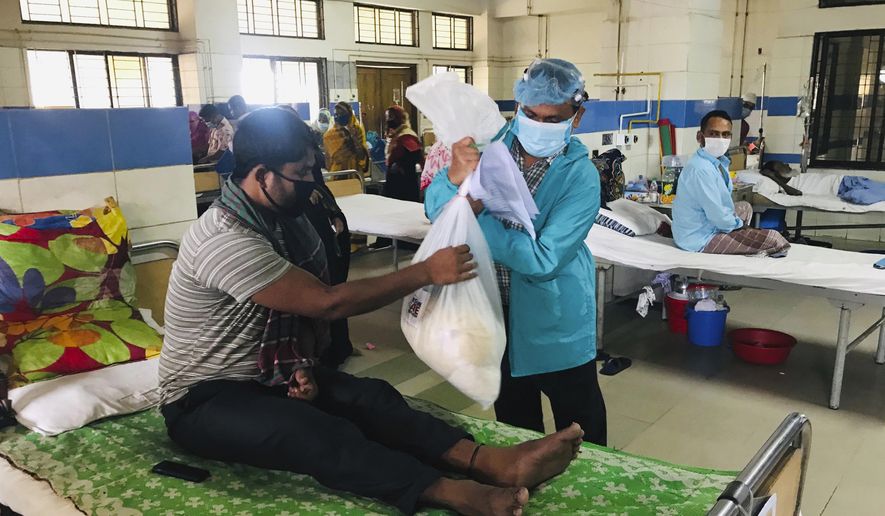DHAKA, Bangladesh (AP) - When Bangladeshi authorities prepared to enforce a nationwide lockdown in late March, three friends fretted: How would rickshaw drivers, factory workers and other working poor people survive?
With only 20,000 takas ($236) in hand, their challenge was to channel resources from the generous haves to the desperate have-nots. They started making appeals for money.
The first response came from Bangladeshi cricket star Shakib Al Hasan who donated 2 million takas ($24,000). With that, they began distributing food packs in the impoverished neighborhoods in Dhaka.
Eventually, they succeeded in bringing about 120 organizations and business houses under one umbrella for their aid campaign, Mission Save Bangladesh. Their work has since expanded to helping families fighting cancer and to arranging supplies of masks and sanitizers.
“People are so generous! They responded to our calls from their hearts,” said Imran Kadir, who founded the campaign with friends Tajdin Hasan and Imtiaz Halim. Kadir spoke with The Associated Press as he and other volunteers visited a cancer hospital in Dhaka to distribute food packs.
“We started distributing food packs in impoverished neighborhoods in Dhaka with the initial funds that came from the Shakib Al Hasan,” said Kadir, 32. “Slowly we expanded our reach outside the capital city.”
Bangladesh’s leading exporter, the garment industry, has been hit hard by the pandemic, and so have its 4 million low-paid workers. The industry reports that orders worth more than $3 billion have been canceled or suspended.
The Bangladeshi development agency BRAC said the incomes of about 51 percent of the country’s rickshaw drivers, 58 percent of factory workers, 66 percent of hotel and restaurant workers and 62 percent of day laborers in non-agricultural sectors have been reduced to zero since the lockdown began.
Businesses have reopened but the recovery would take time.
Many companies channeled money from their corporate social responsibility funds to Mission Save Bangladesh.
“Till now we have raised about $230,000. This is very inspiring,” Kadir said.
The group provided food packs to about 13,000 families and another 60,000 individuals. It provided an ambulance to a group to help families cremate or bury people who died of coronavirus.
In a cancer hospital in Dhaka, volunteers brought food packages for two weeks for the patients, most of whom came from villages.
Abdullah Biswas, a father of a cancer patient in a specialized cancer hospital in Dhaka, was happy to get food packs.
“We came here from Shariatpur,” an area that flooded this year, Biswas said. “We are in serious financial crisis. This aid will help us a lot.”
Slum dwellers were similarly thrilled to receive aid from the volunteers.
“We are delighted. As we are out of work, we have been facing a lot of difficulties to survive with our children,” said Nurjahan Begum, a resident of a slum in Dhaka’s Kalabagn area.
“We pray for the well-being of the aid givers and hope to get more help. We will give them blessings as long as we are alive,” she said.
___
While nonstop news about the effects of the coronavirus has become commonplace, so, too, have tales of kindness. “One Good Thing” is a series of AP stories focusing on glimmers of joy and benevolence in a dark time. Read the series at https://apnews.com/OneGoodThing




Please read our comment policy before commenting.